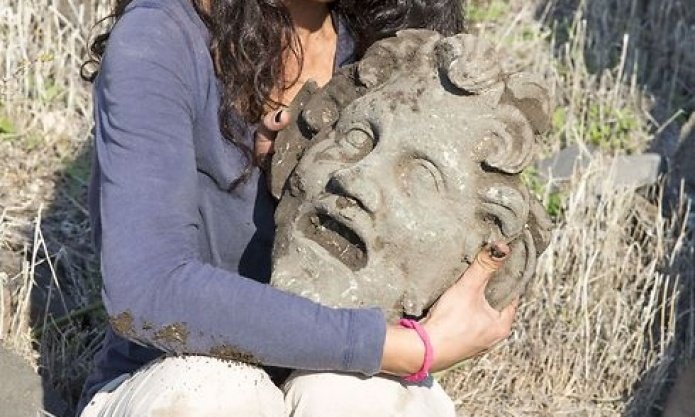A team of researchers from the University of Haifa’s Zinman Institute of Archaeology in northern Israel have uncovered what they believe to be a 2,000-year-old bronze mask representing Pan, the ancient Hellenic God of flocks and shepherds known for His love of music and sexuality.
The team discovered the mask during a one-day dig at the Hippos-Sussita excavation site, just over a mile east of northern Israel’s Sea of Galilee and near what was once the ancient city of Paneas. Michael Eisenberg, the excavation director, said in a statement:
Huffpost reports that according to a press release, the mask is unusually large as compared to other such bronze Pan masks from the Hellenistic and Roman periods. According to Eisenberg, it is 'he only one of its kind' and measures a foot in height and width and weighs more than 10 pounds. The figure has long, pointed ears, horns, strands of a beard and other characteristics associated with the half-man, half-goat god.
The mask may have been used as part of an altar for Pan or as the head of a fountain and dates back to between the first and second centuries, Eisenberg said. It was found in one of the rooms of a large basalt tower, which may have served as part of the city's outer defence.
Although Pan hails from Greco-Roman pagan traditions, ancient worship of the god -- called Faunus in Roman tradition -- has been documented in Israel. Paneas, also called Banias, is now a nature reserve and archaeological site near the ancient city of Caesarea Philippi in the Golan Heights. The city was located within the region known as the 'Panion', named after the deity, and housed shrines and temples in his honour.
Paneas was home to a well-established cave temple to Pan, researchers say, which may explain why the mask was uncovered just outside of city limits. Eisenberg said in his statement:
Excavations of the Hippos site will continue this summer with the goal of clarifying how and why this unusual mask came to be. Funny thing: initially the archaeologists were looking for coins with the help of a metal detector.You can watch a video of the excavation here.
The team discovered the mask during a one-day dig at the Hippos-Sussita excavation site, just over a mile east of northern Israel’s Sea of Galilee and near what was once the ancient city of Paneas. Michael Eisenberg, the excavation director, said in a statement:
"The first thought that crossed my mind was, ‘Why here, beyond the city limits?’ After all, the mask is so heavy it could not have just rolled away."
Huffpost reports that according to a press release, the mask is unusually large as compared to other such bronze Pan masks from the Hellenistic and Roman periods. According to Eisenberg, it is 'he only one of its kind' and measures a foot in height and width and weighs more than 10 pounds. The figure has long, pointed ears, horns, strands of a beard and other characteristics associated with the half-man, half-goat god.
The mask may have been used as part of an altar for Pan or as the head of a fountain and dates back to between the first and second centuries, Eisenberg said. It was found in one of the rooms of a large basalt tower, which may have served as part of the city's outer defence.
Although Pan hails from Greco-Roman pagan traditions, ancient worship of the god -- called Faunus in Roman tradition -- has been documented in Israel. Paneas, also called Banias, is now a nature reserve and archaeological site near the ancient city of Caesarea Philippi in the Golan Heights. The city was located within the region known as the 'Panion', named after the deity, and housed shrines and temples in his honour.
Paneas was home to a well-established cave temple to Pan, researchers say, which may explain why the mask was uncovered just outside of city limits. Eisenberg said in his statement:
“A Pan altar on the main road to the city, beyond its limits, is quite likely, after all, Pan was worshipped not only in the city temples but also in caves and in nature. Because they included drinking, sacrificing and ecstatic worship that sometimes included nudity and sex, rituals for rustic gods were often held outside of the city.”


No comments:
Post a Comment